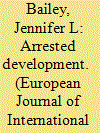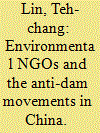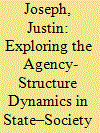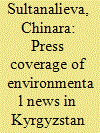| Srl | Item |
| 1 |
ID:
082704


|
|
|
|
|
| Publication |
2008.
|
| Summary/Abstract |
The International Whaling Commission's moratorium on commercial whaling took effect in 1986, seemingly marking the adoption of a new norm, that commercial whaling was no longer acceptable. But this norm has failed to become institutionalized. This article uses the norm life-cycle approach as developed by Finnemore and Sikkink (1998) to account for this failure. The effort ran aground because the norm proved unexpectedly ambiguous, a supporting epistemic community failed to emerge, the norm conflicted with other powerful norms, the prestige of the key anti-whaling states declined relative that of whaling states, and NGO tactics failed to win over the publics in key whaling states and instead created a counter-boomerang effect. The attempt may have resulted in the emergence of an alternative norm, but actors must act now to institutionalize it.
|
|
|
|
|
|
|
|
|
|
|
|
|
|
|
|
| 2 |
ID:
080295


|
|
|
|
|
| Publication |
2007.
|
| Summary/Abstract |
The nature of state-society relations in China has been undergoing a process
of change over the past few decades. It is a process that cannot be obscured, in
which the state and society are incessantly shaping and reshaping their relations. In
the wake of market-oriented reforms, and due to the emergence of environmental
non-governmental organizations (NGOs), the Chinese state has also gradually opened
up to the international community, allowing the linkages between international and
domestic NGOs to be enhanced, and this has further transformed state-society
relations in China. Focusing on the development of environmental NGOs, this
article provides insights into China's changing state-society relations and explores the
key factors that greatly facilitate the transformation of these relations. The anti-dam
movements, which have developed in reaction to the Three Gorges Dam and the
Nujiang project, as well as the issues of resettlement and environmental protection
associated with the dam construction, have caused a new wave of interaction between
the state and society and resulted in a new social movement with Chinese
characteristics
|
|
|
|
|
|
|
|
|
|
|
|
|
|
|
|
| 3 |
ID:
172295


|
|
|
|
|
| Summary/Abstract |
Based on the data from the 13-month field visit spread over two trips (September 2016 to December 2016 and September 2017 to July 2018), this study highlights how securitisation efforts from the central government interact with environmental non-governmental organisation (ENGO) activism and advocacy in China, producing diverse outcomes across temporal and spatial dimensions. The trajectory of state–society relations in the context of environmental governance depends on (a) the ability of party-state to control ‘new media’ activism and manage ENGO advocacy to ‘maintain stability/rule by law’ and (b) ability of the assemblage of media activism and ENGO advocacy, along with other agents, to support the transition from ‘rule by law’ to ‘rule of law’. The overall findings are discussed in the context of the ‘Copenhagen School’ framework in International Relations Theory to examine the process of securitisation in the environmental sector in China. The securitising actor (the one who leads the process of securitisation such as States), referent object (the object under existential threat, i.e. human nature harmony) and functional actors (those who support or oppose the process of securitisation, i.e. ENGOs) are the major players involved.
|
|
|
|
|
|
|
|
|
|
|
|
|
|
|
|
| 4 |
ID:
140764


|
|
|
|
|
| Summary/Abstract |
This article explores obstacles and conditions that environmental nongovernmental organizations face in interacting with media outlets in Kyrgyzstan. It also examines the limited scope of environmental journalism and the resulting limited ability of news outlets and eco-NGOs to help set the public agenda for discussion of policy and issues in the country. Even if such public relations interaction occurs, it is rarely effective and rarely generates influential eco/environmental articles in the media. The study is based on a content analysis of the news agency 24.kg and the newspaper Vecherniy Bishkek. It includes results of a survey and interviews with eco-NGOs representatives.
|
|
|
|
|
|
|
|
|
|
|
|
|
|
|
|